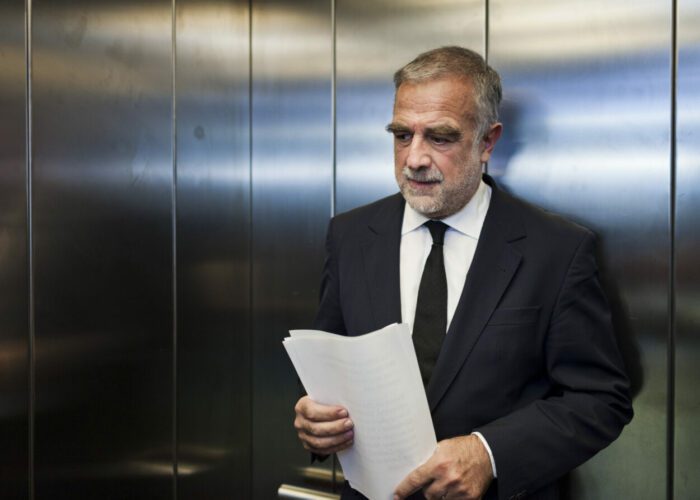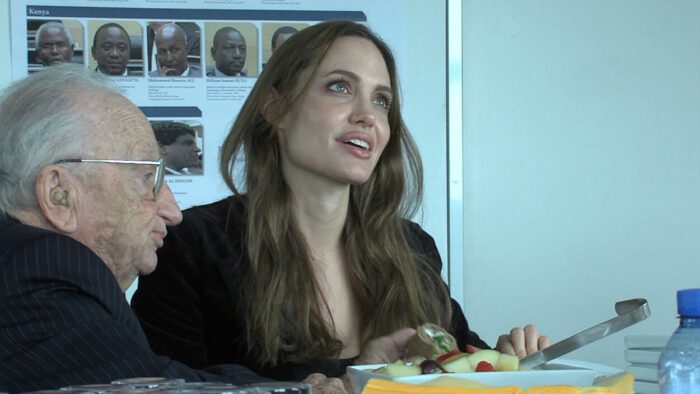As of this writing, over 100 armed conflicts—wars, if you will—are being engaged across the world. The highest number of them are occurring in Africa, followed by Asia, Europe, and Latin America. Some are new, others more than 50 years old. Some make the headlines and capture the attention of the world, others wage with little media notice at all. But what if the very act of war itself were a crime? That is one of the key questions raised in War and Justice, a new documentary from directors Marcus Vetter and Michele Gentile that explores the work of the International Criminal Court.
If the International Criminal Court, or ICC, is unfamiliar to you, it is a collaboration of 120 nation-states who, in July of 1998, worked to transform the Nuremberg Legacy into a permanent institution, a court with the task and teeth to take on the most serious of crimes committed internationally. Those would include crimes against humanity, genocide, war crimes, trafficking, and even the act of war itself: under the purview of the ICC, a war of aggression can be prosecuted. War and Justice goes behind the scenes to contextualize and depict their work—no easy task given the complexity of the undertaking. Nonetheless, the film focuses on a few of the Hague-based ICC’s key personalities and a couple of recent trials to do so, lending the court’s work an immediacy even a newcomer can understand.

Primary among the film’s subjects is the court’s first chief prosecutor, Argentine lawyer Luis Moreno-
Ocampo, who served in this role until 2012 and is returning in the film to Europe for the first time since the conclusion of his assignment. In Nuremberg, Germany—where Nazi leaders once stood trial—Ocampo is soon to address the world community in a keynote speech. Charismatic and confident, Ocampo remains a true believer in the work of the ICC and lends his perspective to one of the court’s current trials, the prosecution of a Congolese warlord accused of trafficking youth in support of his cause.
The second of those subjects is Benjamin Ferencz, who, as an enlisted man under General Patton, fought in every World War II campaign in Europe and later was transferred to a newly created War Crimes Branch of the Army to gather evidence of Nazi brutality and apprehend the criminals. Once discharged from the Army, he worked as a prosecutor at the Nuremberg Trials and later dedicated his life to the pursuit of world peace, especially as an advocate for the work of the International Criminal Court. It’s a pleasure to see him, both in archival footage as a young Nuremberg prosecutor, and in his nineties working still to assist the ICC. Though Ferencz passed away in 2022, in War and Justice, he is depicted as a charming, savvy, and dedicated ally.

The film also presents Angelina Jolie in her humanitarian efforts to support the work of the ICC, lending a bit of star power to the proceedings. Her dedication to the cause may be shorter in tenure than someone like Ocampo’s or Ferencz’s, but it is no less serious nor passionate. Together, they and the ICC’s current chief prosecutor, Karim Khan, make for a formidable team.
The task, though, of prosecuting war crimes, is not at all simple. In the case of the Congolese warlord Bosco Ntaganda, the ICC achieves an uneasy conviction—13 years after his arrest. Other cases seemingly cannot be prosecuted. Take the case of Russia’s invasion of Ukraine (depicted in A Rising Fury), which prompted 43 ICC member states to vote to intervene. Ukraine accepted the ICC’s jurisdiction, but Russia is not a member state: the consent of the aggressor state is required and so the ICC cannot prosecute.
Other of the world’s powers, including China, India, and the United States, have not joined the ICC and do not recognize its jurisdiction, despite its being the first and only permanent international court to prosecute individuals for international crimes of war. Further, the court has been accused of bias, in particular Eurocentrism and racism, as well as of being simply ineffective in its prosecution: in only a handful of instances has the ICC reached, as in the Ntaganda case, a conviction.
War and Justice makes both the high purpose and the unique process of the ICC’s work visible. Theirs is an ambitious mission, driven by a goal of world peace. If it were, as the ICC claims, a crime to wage war, then at least some wars might be forestalled. At a time when over 100 wars are being waged across the globe and some of the world’s major powers are involved in or adjacent to direct conflict, the ICC’s work is truly important, and in War and Justice Vetter and Gentile present the complexity of their efforts with both a historical perspective and a series of human faces, especially those who have admirably dedicated their lives to the cause of world peace.



